¡Hola! Me llamo Mariana, y fui aceptada en Caltech para la Generación del 2028. ¡Mira aquí cómo lo logré!
Mi Trayectoria
Soy de Brasília, donde asistí a una escuela privada con una beca. Mi escuela secundaria nunca había enviado a un estudiante al extranjero, así que no recibí mucho apoyo. Obtuve mucha ayuda del programa Prep, una mentoría preparatoria gratuita para estudiantes brasileños, que me guió a mí y a mis profesores durante el proceso de solicitud.
En total, solicité ingreso a 25 universidades y también fui admitida en UCLA, la Universidad de Arizona, y otras.

Por qué Estados Unidos y Caltech
Me ha interesado la astronomía y la astrofísica desde que era niña. Me di cuenta de que este campo, desafortunadamente, no es muy valorado ni desarrollado en Brasil, con muy pocas universidades que ofrecen títulos en esta área. Sabiendo que Estados Unidos es un centro de exploración espacial con instituciones como NASA y SpaceX, supe que era el mejor lugar para perseguir mis metas.
Elegí Caltech porque es considerada la mejor escuela para mi campo. Me inspiré en la serie The Big Bang Theory, que presenta científicos de Caltech. La universidad tiene un enorme departamento de astronomía, una cultura de innovación y profesores que son brillantes y accesibles. El hecho de que administre el Laboratorio de Propulsión a Chorro (JPL) de la NASA también fue un gran atractivo. Caltech es una escuela pequeña y única con una cultura muy específica que no es para todos.

Mis Estadísticas
Mi promedio de calificaciones fue de 9,57 sobre 10, y me clasifiqué en primer lugar en mi clase de 110 estudiantes. Mi escuela seguía un plan de estudios brasileño estándar.
Tomé el SAT tres veces y obtuve una puntuación final combinada de 1450. Me sentía insegura sobre esta puntuación, pero Caltech era "test-free" y no lo requería. Desafortunadamente, comenzaron a requerir el SAT nuevamente. Envié mi puntuación a todas las otras universidades a las que apliqué. Para la competencia en inglés, tomé el Duolingo English Test una vez y obtuve una puntuación de 145.

Actividades Extracurriculares
Cuando tenía unos 11 o 12 años, después de ver el documental Cosmos, decidí que quería convertirme en investigadora de astrofísica. Poco después, aún en la escuela secundaria, participé en la Olimpiada Brasileña de Astronomía y gané mi primera medalla, lo que me motivó a estudiar astronomía por mi cuenta. Así que cuando entré en la preparatoria, ya sabía lo que quería y usé ese tiempo para experimentar cómo es trabajar en el campo. Por eso me involucré tanto en la investigación, y creo que este "pico" claramente definido en un área —impulsado por mi valor por la excelencia— fue lo que realmente hizo destacar mi solicitud. Enfoqué mis actividades extracurriculares en mi pasión por la astronomía y la astrofísica, creyendo que es mejor ser excelente en un área que simplemente "bien equilibrada".
Caza de Asteroides: Participé en un programa donde analicé imágenes y detecté alrededor de 14 asteroides.
Investigación: Participé en el NASA Space Apps Challenge y convertí mi proyecto sobre tormentas solares en un proyecto de feria de ciencias. También me uní a un grupo de investigación en la Universidad Federal de Río de Janeiro (UFRJ), donde, hasta hoy, estoy investigando la distribución de galaxias.
Voluntariado y Enseñanza: Formé parte de la competencia de cohetes MobFog, obteniendo una beca de investigación, y luego me convertí en asistente de enseñanza.
También fui voluntaria en una ONG llamada Sem Parar, que tiene como objetivo aumentar la participación femenina en las olimpiadas de ciencias, donde di clases de astronomía y me convertí en coordinadora de departamento.

Declaración Personal
Aunque siempre me he sentido un poco insegura sobre mi declaración personal, creo que lo que realmente equilibró mi solicitud fueron los ensayos complementarios de Caltech. De hecho, tenían alrededor de diez ensayos complementarios, lo que me permitió resaltar diferentes aspectos de mí misma con más detalle y profundidad, complementando las partes en las que no me sentía tan segura.
Mi declaración personal en sí se centró en mi curiosidad intelectual. Hablé sobre mi infancia, la influencia de mis padres y mi viaje desde ser una niña tímida y aislada hasta encontrar mi voz a través de la ciencia. El objetivo era mostrar un lado más personal y vulnerable de mí misma, no solo mis logros.

Ayuda Financiera
Fui admitida en Caltech y recibí una beca basada en necesidad económica. Caltech es una institución que considera la necesidad financiera en el proceso de admisión y otorga ayuda en consecuencia. Solicité ayuda utilizando el CSS Profile y presenté las declaraciones de impuestos de mis padres. A diferencia de algunas universidades estadounidenses que garantizan un paquete de ayuda financiera por cuatro años, Caltech revisa la ayuda anualmente, por lo que aunque inicialmente recibí una beca para mi primer año, debo volver a solicitar ayuda financiera cada año.

Experiencia de la Primera Semana
Mi primera semana en Caltech fue la orientación para estudiantes internacionales, que fue emocionante y abrumadora a la vez. Caltech tiene un sistema de alojamiento único donde los nuevos estudiantes pasan las primeras dos semanas "rotando" por ocho residencias diferentes para experimentar sus culturas distintas antes de clasificar sus preferencias.
Esas dos semanas estuvieron llenas de momentos espontáneos de comunidad: cenas compartidas, sesiones de estudio hasta altas horas de la noche donde nos quedábamos despiertos discutiendo sobre sets de problemas, conversaciones improvisadas en las salas comunes y tradiciones amistosas de las residencias. Una noche, una compañera de clase incluso me invitó a cenar a su casa fuera del campus; otra noche, fuimos a ver cómo encendían las linternas en uno de los patios de las residencias.
¡Me sorprendió que, a pesar del intenso rigor académico de Caltech, hay un lado notablemente cálido y humano en la vida estudiantil!

Experiencia General
Mi proceso de adaptación fue muy difícil, principalmente porque Caltech es una escuela extremadamente rigurosa. Las clases están en un nivel súper avanzado; nuestra primera clase de matemáticas, por ejemplo, ni siquiera es cálculo, sino "análisis real".
Honestamente, no hay un verdadero equilibrio entre la vida personal y académica aquí. Todo gira en torno a lo académico. Incluso cuando no estamos en clase, estamos haciendo investigación o trabajando en algún proyecto. Creo que la identidad de muchas personas, incluida la mía, se centra mucho en nuestro campo de estudio. Este "desequilibrio intencional" es simplemente parte de la cultura única de Caltech.
Me resultó más difícil hacer amigos aquí que en Brasil. La cultura es muy diferente, y siento que tenemos una "calidez brasileña" única que es difícil de encontrar en otros lugares. Aunque fue desafiante, el pequeño tamaño de la clase de pregrado (solo unos 200 estudiantes por año) hizo que fuera más fácil conocer a la gente, y pude hacer algunos buenos amigos.

Planes después de la graduación
Dado que mi campo es muy académico, mi siguiente paso natural es ir a la escuela de posgrado y obtener un doctorado. Planeo solicitar programas de doctorado durante mi último año para poder continuar con mi investigación. También estoy interesada en el lado industrial, particularmente en la intersección entre la exploración espacial y la economía. Pero por ahora, mi plan principal es seguir un doctorado y continuar trabajando en investigación.







